Current Doctoral Students (Batch-wise)
2009
2009 2010 | 2011 | 2012 | 2013 | 2014 |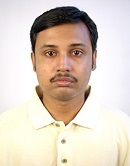
Email ID: mandar@iitg.ernet.in
Contact: 7896793298
Educational Qualification: B.Tech.,M.Tech.
Roll Number: 09610224
Joining Date: 30/12/2009
Research Interest: MEMS Sensor
Thesis Supervisor: Prof. H.B.Namade
Thesis title:Piezoelectricity of Monolayer MoS2
Abstract:
Single layer MoS2 possesses piezoelectricity which disappears with the increase of layers. The intrinsic piezoelectricity of monolayer or few layers MoS2 under alternating electric field will produce vibration. The objective is to study the piezoelectric resonating property of monolayer MoS2 for sensor application. The application of the device is predicted as sensor with a better sensitivity.
Publications:
Journals
Conferences
2010
2010 2009 | 2011 | 2012 | 2013 | 2014 |
Email ID: madhulika@iitg.ernet.in
Contact:+91-7896172212
Educational Qualification:B.Tech.,M. Tech.
Roll Number: 10610206
Joining Date: 23/07/2010
Research Interest:Optimal sliding mode control
Thesis Supervisor: Prof. Chitralekha Mahanta
Thesis title: N/A
Abstract: N/A
Publications:
Journals
Conferences

Email ID: basudeba@iitg.ernet.in
Contact: +91-8812016250
Educational Qualification: B.Tech.,M.Tech.
Roll Number: 10610216
Joining Date: 27/07/2010
Research Interest: MEMS/NEMS, Microelectronics, VLSI
Thesis Supervisor: Prof. H.B.Nemade
Thesis title: Surface acoustic wave driven sandwich structured piezoelectric motor
Abstract:
I am working towards my PhD thesis entitled as “Surface acoustic wave driven sandwich structured piezoelectric motor” in the specialization of Micro-electromechanical system (MEMS). The proposed surface acoustic wave (SAW) motor with a cylindrical shaft sandwiched between two piezoelectric stators is capable of making both translational and rotational motion in forward and reverse directions. The distinct feature of the design is a cylindrical shaft sandwiched between two identical piezoelectric stators providing friction drive at the contact surfaces. Each stator has an interdigital transducer (IDT) fabricated on the piezoelectric substrate on either side of the shaft. The generation of SAW on the stator surface interacts with the shaft at the line of contact and the frictional force acts on the shaft in the direction opposite to the SAW propagation. Developing an ultrasonic motor in micro scale dimensions, which will be applicable for printers and personal device assistance (PDA), like operating camera lenses in smart phones, DSLR cameras, and tablets. This device can also be applicable in space application with its special type of characteristics to work in such harsh environments. Dealing with the Mathematical Modeling, Finite element simulation and Clean room fabrication of the proposed MEMS device.
Publications:
Patents
Journals
Conferences

Y. Venkata Karteek
Email ID: yanumula@iitg.ernet.in
Contact: +91-9401784052
Educational Qualification: B.Tech.
Roll Number: 10610219
Joining Date: 21/07/2010
Research Interest: Multi-agent systems, Robotics
Thesis Supervisor: Dr.Indrani Kar and Prof. Somanath Majhi
Thesis title:N/A
Abstract:
Designing algorithms and implementing on a multi-robot time-delayed system with different communication topologies is being done. Time delays associated with sensors , inter-agent communication are considered and a back-stepping algorithm is proposed and validated to overcome the communication loss cases while reaching consensus. The algorithms are simulated for three robot system and it is validated on hardware with two autonomous robots powered by Beaglebone Black mother-board developed in laboratory and third robot, a research Patrolbot from Adept Mobilerobots. Consensus of time-delayed nonlinear multi-agents is implemented on non-mobile Arduino boards using pulse width generated by a pwm pin and its rate of change as states to be considered for consensus.
Publications:
Journals
Conferences

Email ID: v.lukose@iitg.ernet.in
Contact: +91-8547523445
Educational Qualification: B.Engg.,M.Tech.
Roll Number: 10610225
Joining Date: 12/07/2010
Research Interest: Multi-agent systems
Thesis Supervisor: Prof. H.B.Namade
Thesis title: Design of SAW resonator for sensor appication
Abstract:
This work involves the simulation and fabrication of surface acoustic wave (SAW) resonators as sensor for measuring liquid properties and gas concentarions. Piezoelectric material is used as the substrate over which comb-shaped metallic electrodes called as interdigital transducer (IDT) are fabricated. Trenches are made on piezoelectric substrate and the sensing film is coated on the trenches. Conducting and non conducting film is used for measuring various gas concentrations. The absorption of gases changes sensing film material properties such as Young’s modulus density thickness etc, which changes the velocity of SAW causing change in resonance frequency of the SAW resonator.
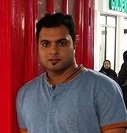
Email ID: tousif@iitg.ernet.in
Contact:+91-7663-864-124
Educational Qualification:B.E (Electrical & Electronics Engineering) From: VTU Belgaum,M. Tech (Power Electronics) From: NIT Trichy
Roll Number: 10610229
Joining Date: 27/12/2010
Research Interest:Control of Power Converters, Optimization techniques.
Thesis Supervisor: Prof. Chitralekha Mahanta
Thesis title: Observer Based Adaptive Control of DC-DC Converters
Abstract:
An observer based adaptive control technique for the Buck type DC-DC converter is proposed. An adaptive backstepping control and Chebyshev neural network (CNN) is integrated to developed a novel controller. The systematic design of backstepping controller has been improvised by incorporating the approximation of unknown load resistance parameter by a single layer Chebyshev neural network. The proposed method significantly improves voltage and current transient performances. Next, the extension of this work is carried out for angular velocity tracking in buck converter fed permanent magnet dc (PMDC)-motor. Owing to the universal approximation property of CNN, neural networks have been utilized for approximating the unknown nonlinear profile of instantaneous load torque. The inherent computational complexity of the neural network based adaptive scheme has been circumvented through the use of orthogonal Chebyshev polynomials as basis functions. The proposed control scheme is shown to yield a superior output performance with enhanced robustness for wide variations in load torque and set-point changes, compared to existing conventional approaches based on adaptive backstepping. The theoretical propositions are verified on an experimental prototype using dSPACE, Control Desk DS1103 setup with an embedded TM320F240 Digital Signal Processor proving its applicability to real-time electrical systems.
Publications:
Journals
Book Chapters
Conferences
Google Scholar Link: https://scholar.google.co.in/citations?user=KQpFFwMAAAAJ&hl=en

Vinay Kumar Pandey
Email ID: p.vinay@iitg.ernet.in
Contact: N/A
Educational Qualification: B.Tech.,M.Tech.
Roll Number: 10610230
Joining Date: 28/12/2010
Research Interest: Adaptive control, Multiple models, Nonlinear SISO/MIMO systems, TRMS model.
Thesis Supervisor: Dr.Indrani Kar and Prof. C. Mahanta
Thesis title:Multiple Model Adaptive Control Design and Analysis for Nonlinear Systems
Abstract:
In my research work an adaptive controller using multiple models is proposed for nonlinear SISO/MIMO systems with uncertain parameters. The uncertain parameters are assumed to belong to a closed and bounded region. Multiple identification models are distributed evenly in this region of uncertainty and their unknown parameters are tuned. A second level adaptation scheme is applied to combine all the models efficiently. The proposed method is applied to nonlinear plants with linear/nonlinear parameterizations. The commonly known problems with adaptive control systems like oscillatory transient response, poor parameter convergence and sluggish performance are found to be improved considerably by using this proposed multiple model based adaptive controlle
Publications:
Book Chapters
Conferences
2011
2011 2009 | 2010 | 2012 | 2013 | 2014 |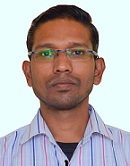
Email ID: sushanta@iitg.ernet.in
Contact: +91-8133917546
Educational Qualification: B.Sc.,M.Sc.,M.Tech.
Roll Number: 11610204
Joining Date: 20/07/2011
Research Interest: MEMS and Energy Harvesting
Thesis Supervisor: Prof. H.B.Namade
Thesis title:Piezoelectric Vibration Energy Harvester
Abstract:
This work involves mathematical modeling and finite element simulation of piezoelectric vibration energy harvesters. Conventional piezoelectric vibration energy harvester geometrical structure is modified to get higher harvested electrical power density and better device reliability.
Publications:
Journals
Conferences

Email ID: a.nabanita@iitg.ernet.in
Contact: 9864428032
Educational Qualification: B.Engg.
Roll Number: 11610206
Joining Date: 21/07/2011
Research Interest: Sliding Mode Control
Thesis Supervisor: Dr. Chitralekha Mahanta
Thesis title:Adaptive backstepping sliding mode control of robot manipulators
Abstract:
The research is aimed towards developing a stable and robust controller for MIMO robot manipulator systems. The backstepping algorithm is used to arrive at a sliding surface with the desired dynamics that can be used for regulation as well as trajectory tracking of robot manipulator joints. The controller is also extended to task space control of the manipulator where the end-effector or the tool frame trajectory is controlled. Moreover the implementation of torque control on position commanded robot manipulators is also experimented on so that the interaction control of the manipulator and the external environment can be realized even for position commanded manipulators.
Publications:
Journals
Conferences

Email ID: c.arghya@iitg.ernet.in
Contact: +91-8011230564
Educational Qualification: B.Tech.
Roll Number: 11610211
Joining Date: 28/07/2011
Research Interest: Robust and Adaptive control theory with application to Failure tolerance in aerospace systems
Thesis Supervisor: Dr. Chitralekha Mahanta
Thesis title:Fault Tolerance in Aerospace Systems
Abstract:
Currently, my research is focused on the design of actuator fault tolerant control strategies for nonlinear uncertain systems with relevance to aircraft control applications. Further, the control schemes is also aimed at achieving an expanded flight envelope and should guarantee faithful operation encompassing a wider flight regime. Generally, aircrafts are highly complex nonlinear systems and are exposed to rugged environmental conditions in due course of flight operations. Hence, these systems are extremely vulnerable to sudden malfunctioning of its components leading to undesired system behavior. Actuators being an integral component of an aircraft system would inevitably be prone to such faults in the form of partial loss of effectiveness or complete failures. In absence of a self-repairing control module, these eventualities of fault/failures onboard, may often lead to degraded system performance or even instability culminating in catastrophic accidents with high casualties. In consequence, recent decades have witnessed increasing demands for high levels of aircraft reliability and onboard flight safety eventually leading to the inception of a new control paradigm widely known as Fault Tolerant Control (FTC). Aircraft autopilots equipped with such an FTC module would sufficiently be able to manage faulty situations and assist the crew in rapidly recovering from the adverse effects of actuator failures through subsequent compensation of failure induced uncertainties followed by system redundancy. However as stated earlier, nonlinear complex dynamics, actuator magnitude and rate constraints combined with structural limitations of the aircraft system, pose numerous challenges to the problem of an effective FTC design. On account of the same, fault tolerant control design for aircraft systems has received considerable attention from the research community and has made significant progress in recent decades.
Publications:
Journals
Conferences
Google Scholar Link: https://scholar.google.com/citations?user=AnThmtsAAAAJ

D. Viswanath
Research Interest:Sliding mode control
Thesis Supervisor: Dr.S. Krishnaswamy
Thesis title:N/A
Abstract:N/Aread more
Email ID:d.viswanath@iitg.ac.in
Contact:N/A

Email ID: p.saurabh@iitg.ernet.in
Contact: +91-8811-909-756
Educational Qualification: B.Tech.
Roll Number: 11610240
Joining Date: 26/12/2011
Research Interest: Relay Control Systems, System Identification
Thesis Supervisors: Prof.Somanath Majhi
Thesis title:N/A
Abstract:
In this work, a single relay feedback experiment has been conducted for identification of a class of single input and single output (SISO) processes in terms of stable, unstable first order plus dead time (FOPDT), second order plus dead time (SOPDT) models using describing function (DF) and state space approach. The equivalent gain of relay is derived using DF approximation and utilized in the derivation of mathematical expressions for the identification of various time delay processes. For an accurate identification, a set of generalized mathematical expressions using state space approach have been deduced. From the expression of SOPDT process output, mathematical expressions for the identification of stable and unstable FOPDT processes are deduced. During real time scenarios, limit cycle output suffers from the adverse effects, such as bias, noise etc., due to presence of unknown uncertainties at the output. Moreover, noise alleviation at the process output is achieved through Fast Fourier Transforms. In addition, methods for elimination of static load disturbances over the process output have also been investigated during the model identification.
Publications:
Journals
Conferences
Google Scholar Link: https://scholar.google.com/citations?user=eX5MxNQAAAAJ&hl=en
2012
2012 2009 | 2010 | 2011 | 2013 | 2014 |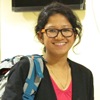
Gargi Baruah
Email ID: gargi.baruah@iitg.ernet.in
Contact: 9085856967
Educational Qualification: B.Engg.,M.tech.
Roll Number: 126102007
Joining Date: 02/08/2012
Research Interest: Fractional order Controller Design
Thesis Supervisors: Prof. Somanath Majhi and Prof. Chitralekha Mahanta
Thesis title:N/A
Abstract:
Fractional order controllers have dynamical behaviour described by fractional calculus or by the differential equations, the orders of which might not be an integer number. This report deals with such controllers, especially series form of Fractional order proportional and derivative FOPID controllers. The objective of designing such controllers is to validate and showcase the results in the area of identification and control, and then to show their usefulness by applying them to different plant models which can be FOPDT or SOPDT in nature. The most practical plant models are considered here i.e. the plants having delay or dead time. For tuning the controllers, relay based auto-tuning is used. Both offline and online methods are discussed here. A relay with hysteresis is chosen for the auto-tuning method and describing function method is used for approximating it. The proposed method is then verified through the simulations of a class of process models. Also experimental analysis is carried out on a real time Coupled Tank System (CTS).
Publications:
Journals
Conferences
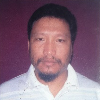
Radak Blange
Research Interest:Sliding mode control
Thesis Supervisor: Prof. A. K. Gogoi & Prof. C. Mahanta
Thesis title:N/A
Abstract:N/Aread more
Email ID:radak@iitg.ac.in
Contact:N/A

Email ID: suman.roy@iitg.ernet.in
Contact: 9085317356
Educational Qualification: B.Tech.,M.Engg.
Roll Number: 126102024
Joining Date: 28/12/2012
Research Interest: Pseudorandom Number Generation
Thesis Supervisor: Dr.S. Krishnaswamy
Thesis title:N/A
Abstract:
Pseudorandom number generators (PRNGs) find many applications ranging from cryptography, error correcting codes to spread spectrum communication. Due to simplicity in hardware implementation, Linear Feedback Shift Registers (LFSRs) are commonly used as basic building blocks for the PRNGs. Sequences that are generated by LFSRs with primitive characteristic polynomials have some statistical properties associated with randomness. However, these sequences have low linear complexity which is highly undesirable from cryptographic point of view. Various methods have been suggested to overcome this shortcoming. One such method is the use of Nonlinear Feedforward Generators (NLFGs). Conventional LFSRs do not efficiently utilize the parallelism provided by word based processors. In order to overcome this shortcoming various word based configurations of LFSRs have been suggested. Sigma LFSR is one of them. Analysis of sequences generated by the NLFGs over a sigma LFSR has been studied.
Publications:
Conferences
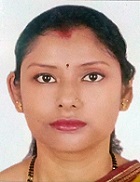
Email ID: karnika@iitg.ernet.in
Contact: 9954917688
Educational Qualification: B.Tech.,M.tech.
Roll Number: 126102025
Joining Date: 28/12/2012
Research Interest: Optimal Control,Intelligent Control,Robotics,Embedded Systems.
Thesis Supervisors: Dr.Indrani Kar
Thesis title:Optimal Moving Target Tracking by Mobile Robot
Abstract:
Moving target tracking is gaining popularity in many different application areas including but not limited to service robotics, inspection and monitoring, rescue and surveillance. A mobile robot deployed for this purpose needs to actively interact with the changing environment as it shares its workspace with other robots and/or human beings. The objective of this research is to find out the optimal state and optimal control trajectories for tracking a moving target in a dynamic environment. Dynamics is rendered to the environment by dint of motion of the target and the obstacles, where, any other human/robot than the target may be perceived as obstacles. The study includes designing of suitable algorithms for implementation in real time on Patrolbot, an indoor mobile robotics platform from the Pioneer family.
Publications:
Conferences
2013
2013 2009 | 2010 | 2011 | 2012 | 2014 |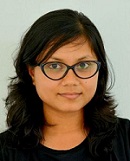
Email ID: d.uddipana@iitg.ernet.in
Contact: +91-9085857290
Educational Qualification: B.Tech.
Roll Number: 136102006
Joining Date: 30/07/2013
Research Interest: Cryptography (Homomorphic Encryption)
Thesis Supervisor: Dr.S. Krishnaswamy
Thesis title:Fully Homomorphic Encryption
Abstract:
Fully Homomorphic Encryption is a cryptographic development that enables computation on encrypted data by illegitimate parties without the knowledge of the actual data. The objective of this research is to construct a fully secure fully homomorphic cryptosystem based on multivariate polynomial rings and work towards its implementation in the practical world.

Email ID: arobindra@iitg.ernet.in
Contact: N/A
Educational Qualification: N/A
Roll Number: N/A
Joining Date: N/A
Research Interest: Control Systems
Thesis Supervisor: Prof. Chitralekha Mahanta
Thesis title:N/A
Abstract: N/A
Publications:
Conferences

Email ID: trusna@iitg.ernet.in
Contact: +91-9678241879
Educational Qualification: B.Tech.
Roll Number: 136102020
Joining Date: 02/01/2014
Research Interest: Identification and control of Nonlinear systems
Thesis Supervisors: Prof.Somanath Majhi
Thesis title:Identication of Block-Oriented Nonlinear Systems using Relay Feedback
Abstract:
Relay feedback is widely used in process control industries, but its application is limited mainly to linear systems. My research focuses on use of relay feedback for the identification of simplest block oriented non-linear models i.e, Wiener and Hammerstein.
2014
2012 2009 | 2010 | 2011 | 2012 | 2013 |
Email ID: kamakshi@iitg.ernet.in
Contact: +91-9085-817-933
Educational Qualification: B.Tech.
Roll Number: 146102017
Joining Date: 22/07/2014
Research Interest: Model Predictive Control
Thesis Supervisors: Prof.Somanath Majhi
Thesis title:N/A
Abstract:
Model Predictive Control (MPC) is an optimal control strategy which uses a model to predict the future behavior of the plant. An optimization problem is solved in a finite future time interval and the first control input is implemented . MPC is mainly preferred because it can handle constraints to give better performance. One of the difficulty in MPC is the number of tuning parameters available is more as compared to conventional controller i.e. PID. So research has been going on to reduce the number of tuning parameters.
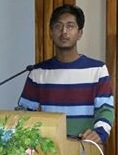
Abhijit Mazumdar
Email ID: abhijit.mazumdar@iitg.ernet.in
Contact: +91-9613184474
Educational Qualification: B.Tech.
Roll Number: 146102019
Joining Date: 22/07/2014
Research Interest: Control Over Communication constraints
Thesis Supervisors: Prof. Somanath Majhi and Dr.S. Krishnaswamy
Thesis title:N/A
Abstract:
Networked Control Systems (NCSs) are spatially distributed systems where the various subsystems, e.g. sensors, controllers and actuators communicate with each other through some shared networks. NCSs provides many advantages e.g. low wiring cost, remote control etc. However inclusion of shared communication medium introduces some serious issues like Time delay, Packet loss, Quantization. Design of the NCSs becomes very complicated because of the aforementioned issues. My work is to investigate the impact of these issues on the performance of NCSs.

Email ID: b.mriganka@iitg.ernet.in
Contact: +91-9474-301-403
Educational Qualification: B.Tech.(E.E.) From WBUT.,M.E.(Control System) From BIT Mesra
Roll Number: 146102032
Joining Date: 26/12/2014
Research Interest:Model Predictive Control,Non Linear Control,Control of Power Converters
Thesis Supervisors: Prof.Somanath Majhi
Thesis title:N/A
Abstract:N/A
Publications:
Conferences

Email ID: s.phukan@iitg.ernet.in
Contact: +91-9706129288
Educational Qualification: B.Tech.
Roll Number: 146102036
Joining Date: 26/12/2014
Research Interest: Robotics,Robot Motion Planning
Thesis Supervisor: Dr. Chitralekha Mahanta
Thesis title:Synchronization control of dual arm robotic manipulators
Abstract:
The main objective of my work is to design a robust synchronized controller to control a dual arm robotic manipulator. The synchronization control schemes not only guarantee the asymptotic convergence of position tracking errors but also concern with how these errors converge to the equilibrium point. The proposed control algorithm must ensure that each manipulator tracks its desired trajectory while synchronizing its motion with the other manipulator's motion so that the differential (or synchronization) position error of the manipulators converge to zero. Both desired position and orientation of the end-effectors will be taken into consideration which makes the controller to be more general.
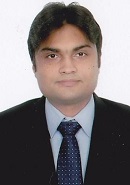
Email ID: gautam.sethia@iitg.ernet.in
Contact: +91-7664889660
Educational Qualification: B.Tech.
Roll Number: 146102041
Joining Date: 26/12/2014
Research Interest: State observer design, Relay System
Thesis Supervisors: Prof. Somanath Majhi and Dr. Sisir Kumar Nayak
Thesis title:SOC Estimation of Li-ion Battery
Abstract:
Accurate state of charge (SOC) estimation of battery is one of the most challenging tasks for promoting the commercialization of electric vehicles (EV’s). The battery management system (BMS) is a vital part in EV’s and needs to operate precisely in order to achieve improved performance, cost effectiveness, increased security, extended lifespan etc. The available power in a battery can be directly obtained from the SOC information and hence it is imperative to get its value accurately for best performance of EV’s. SOC estimation of a Li-ion battery consists of three steps: modelling of L-ion battery, parameter estimation of Li-ion battery model and states observation of battery dynamics. The RC equivalent circuit model is used for the purpose of modelling of Li-ion battery. They are simple and reasonably accurate. A novel approach for parameter identification of a battery model using relay feedback approach is suggested using MATLAB/SIMULINK. For the verification of this technique, a practical circuit will be made to observe the changing and discharging characteristics. With the help of those characteristics, the parameters of battery can be estimated. For state estimation, higher order sliding mode observer, super twisting sliding mode observer, integral sliding mode observer, advanced kalman filter techniques etc will be used. Hardware implementation will also be done for these results for verification purpose.